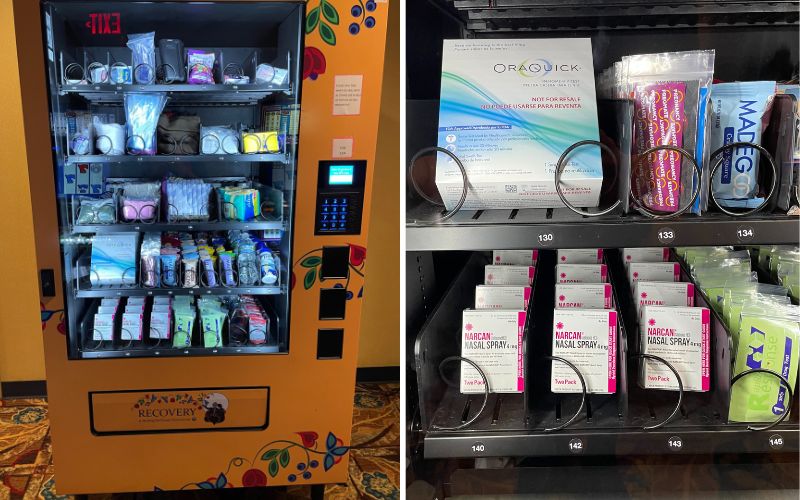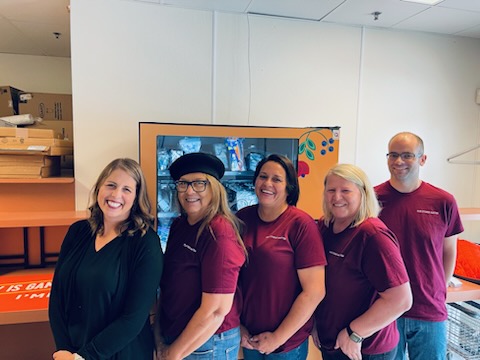
- Details
- By Elyse Wild
Toni Wakemup’s phone used to be a lifeline for people in the Bois Forte Band of the Chippewa community who used opioids or had family members who did.
Wakemup said all it took was a text message, and she would meet with the sender to bring what they asked for: doses of Naloxone, the life-saving overdose reversal drug commonly referred to by its brand name, Narcan.
“I felt really strongly that people needed access to this medication,” Wakemup, who has been handing out Narcan since 2019, told Native News Online.
These days, Wakemup’s phone buzzes with notifications of a different sort. They’re from a mobile app that’s connected to a newly installed public health vending machine on the Bois Forte reservation, letting her know it needs to be restocked with Narcan, clean needles, fentanyl testing strips and other items.
The vending machine, one of two on the reservation, offers community members access to no-cost health safety items and other essentials, including HIV and diabetes test kits; rapid COVID tests; face masks; hygiene items like toothbrushes, toothpaste, socks, and underwear; and first aid kits.
The machines—one at a convenience store in Nett Lake on the reservation, the other an hour east at the tribe’s Fortune Bay Casino—are funded by a Human Resources and Services Administration grant. They’re the result of a collaboration by Wakemup, Johns Hopkins University Center for Indigenous Health, the University of Minnesota Duluth’s College of Pharmacy, Bois Forte Tribal Council, and the Bois Forte Community Research Council.
Bois Forte is the first Tribal nation to install the vending machines in the state of Minnesota, where Native Americans were 10 times more likely to die of an opioid overdose in 2021 than white Minnesotans.
Nationwide, more than 109,000 Americans died in opioid-related incidents in 2022, according to the Centers for Disease Control and Prevention (CDC). That’s up more than 200% since 2000, according to CDC data, and by all accounts the situation is worsening. The opioid crisis is in its fourth wave, characterized by the proliferation of fentanyl—a highly lethal synthetic opioid that is more addictive and 50 times stronger than heroin—in the drug supply.
While commonly mixed with other opioids, fentanyl is increasingly found in non-opioid stimulant drugs such as cocaine and methamphetamine, increasing the risks of addiction and overdose.
While Americans of all races and ethnicities have been affected, the proliferation of opioid deaths has disproportionately affected Black, Indigenous, and People of Color (BIPOC) communities, especially Indigenous people.
As Tribal nations across Indian Country contend with rising numbers of opioid-related deaths, many are embracing harm reduction, an evidence-based public health strategy that aims to reduce the adverse effects of drug use — such as overdose and infectious disease. Harm reduction efforts often include clean needle exchanges and Narcan distribution. Advocates consider it an essential bridge between addiction and recovery.
On the Bois Forte reservation, the public health vending machines are both a harm reduction tool that supplies life-saving materials and a beacon transmitting a message of care to community members who are in active addiction.
Wakemup, who has been in recovery for five years, knows how hard it is to access harm-reduction supplies or recovery services in a rural community. She also knows what it’s like to wear the stigma of addiction in a tribal community.
“Once you’re an addict, that is a label that is hard to drop,” Wakemup said.
A public health vending machine like the ones she helped get installed would have made her feel cared about while she was in active use, she said.
 Dr. Laura Palombi, Pamela Hughes, Toni Wakemup, Wendy Long and Dr. Sean Allen in front of the public health vending machine in Nett Lake on the Bois Forte Reservation. (photo courtesy of Toni Wakemup)
Dr. Laura Palombi, Pamela Hughes, Toni Wakemup, Wendy Long and Dr. Sean Allen in front of the public health vending machine in Nett Lake on the Bois Forte Reservation. (photo courtesy of Toni Wakemup)
Prevalent, but not discussed
Harm reduction vending machines have existed for more than 30 years but are relatively new to the United States. The first harm reduction vending machines were installed in Denmark in 1987. Today, there are hundreds across Europe and the United Kingdom. The vending machines offer the benefit of anonymity and 24-hour access.
In recent years across the United States, as opioid-related overdoses have been on a steady rise, vending machines dispensing life-saving harm reduction supplies are popping up on college campuses and city health centers. Last year, the Pala Band of Mission Indians made headlines when they installed the first Narcan vending machine on Tribal lands.
The first public health vending machine in the United States was installed in Clark County, Nevada, in 2017. A study conducted by Dr. Sean Allen concluded Narcan dispersal from the machine was associated with 41 fewer deadly overdoses the following year.
Allen, a professor at the Bloomberg School of Public Health, and Dr. Melissa Walls (Bois Forte and Couchiching First Nation Anishinaabe), director of the Great Lakes Hub for the Johns Hopkins Center for American Indian Health, brought the Clark County findings to the Bois Forte Community Research Council two years ago.
As in many communities, Wakemup said drug use and its effects were prevalent but not often discussed, making it difficult to gauge if Bois Forte would embrace harm-reduction and support the installation of the vending machines.
The community research council took a survey of more than 500 community members, asking questions to determine if they would use Narcan if it were made available. The answer was a decisive “yes.”
Wakemup, who had been handing out Narcan for nearly three years at that point, wasn’t surprised.
“I was handing out 24 doses a month,” Wakemup said. “That means there were more overdoses than were being reported to 911.”
After a presentation by Walls and Allen, the Bois Forte Reservation Tribal Council passed a unanimous vote in 2022, authorizing the implementation of the public health vending machines on reservation lands.
Bois Forte Chairwoman Cathy Chavers said learning about the vending machines was her introduction to harm reduction.
“We don’t want our people to be dying of overdoses, or to not have socks, or whatever their needs might be,” Chavers told Native News Online. “This gives them access, and it can be discrete. These are our family members, our friends, our relatives … why would we not do this?”
The opposite of addiction
When the vending machines arrived in October 2023, Wakemup cried.
“I was so happy,” she said. “I just want people to become more healthy and to come together and to be stronger together. If we’re not treating addicts like human beings, we’re not going to get better.”
The machines are restocked 2-3 times a week. The volunteer team that monitors and stocks the machines are notified via an app when an item is dispensed.
Pamela Hughes, a Bois Forte member and project research manager for the University of Minnesota, stocks the vending machine in Fortune Bay while Wakemup stocks the one in Nett Lake. Hughes has been working in harm reduction and substance-abuse treatment since the early 1980s.
She says other Minnesota tribes have reached out for guidance on installing the harm-reduction vending machines on their reservations.
“The opposite of addiction is not sobriety; the opposite of addiction is connection,” Hughes said. “When we are stocking these machines, our hands are touching something that is going to save someone’s life.”
Tell Us What You Think
More Stories Like This
New Mexico Will Investigate Forced Sterilization of Native American WomenUSDA Expands Aid for Lost Farming Revenue Due to 2025 Policies
Two Feathers Native American Family Services Wins 2026 Irvine Leadership Award
Bill Would Give Federal Marshals Authority to Help Tribes Find Missing Children
Indian Health Service to Phase Out Mercury-Containing Dental Amalgam by 2027


